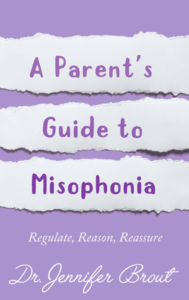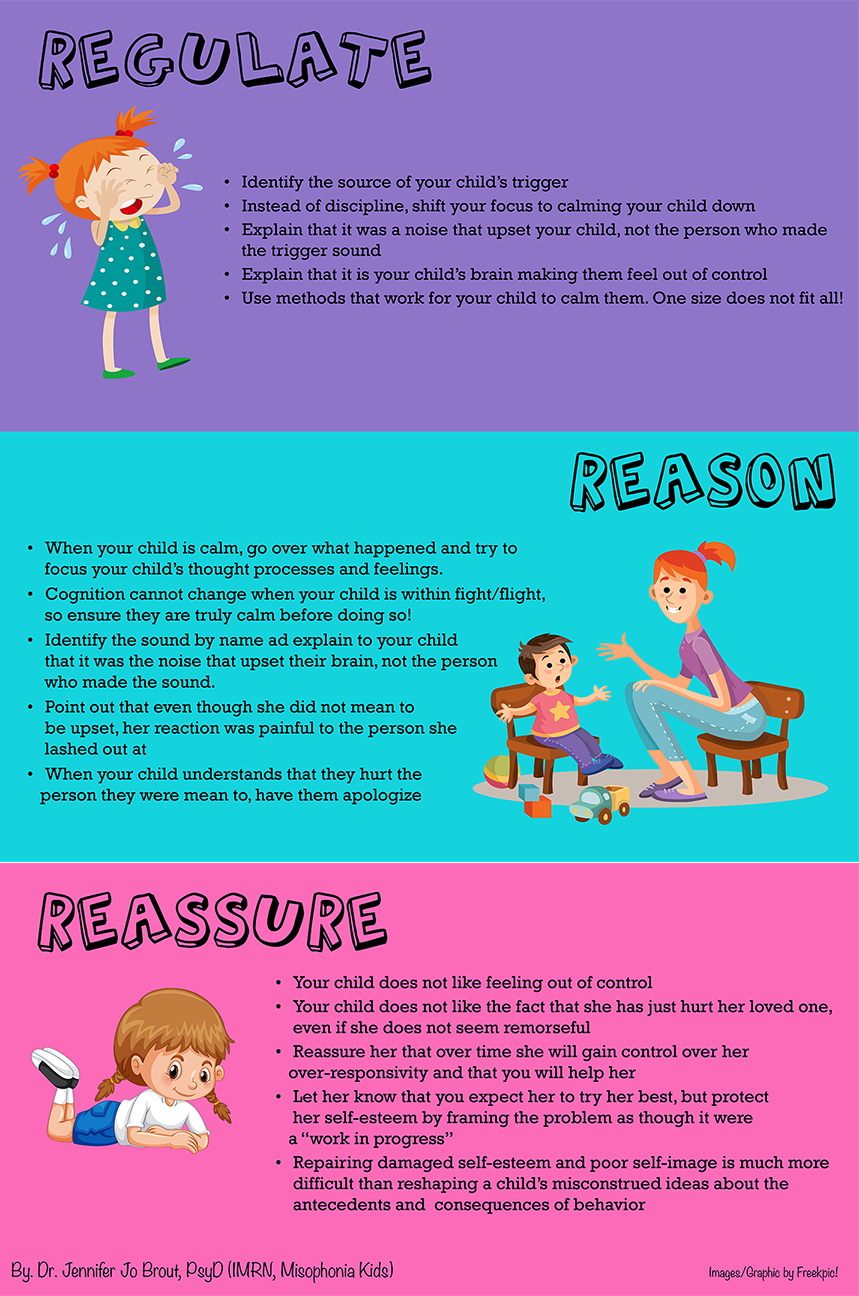 Regulate, Reason, Reassure: A Parent’s Guide to Understanding and Managing Misophonia, is a coping skills manual for parents to help their own children and teens manage misophonia. RRR was developed by Dr. Jennifer Brout through her own experiences as a clinician, a sufferer of misophonia, and the mother of an adult child who showed signs of misophonia at a young age. RRR gives parents the tools to help mediate misophonia and provides easy to follow guidelines and work sheets to ensure parents have the skills to continue practicing RRR with their child as they grow and develop.
Regulate, Reason, Reassure: A Parent’s Guide to Understanding and Managing Misophonia, is a coping skills manual for parents to help their own children and teens manage misophonia. RRR was developed by Dr. Jennifer Brout through her own experiences as a clinician, a sufferer of misophonia, and the mother of an adult child who showed signs of misophonia at a young age. RRR gives parents the tools to help mediate misophonia and provides easy to follow guidelines and work sheets to ensure parents have the skills to continue practicing RRR with their child as they grow and develop.
Available in print and Kindle on Amazon
Short Summary for Parents
Regulate: In order to assist a child in regulating (calming the child so that he or she is not over-aroused and agitated), it is helpful to identify the source of the sensory over-responsivity, or auditory trigger. For example, if your school-age child has just hit her sister because she made a noise that set her off, rather than react punitively, shift her focus to “calming down.” Explain that a particular noise set her off, that her brain is making her feel out of control, and let her know that you don’t blame her. There are numerous strategies for regulating an over-aroused child. Because your child is a person and not a “disorder,” the ways in which you can help him or her calm down vary. There are a number of evidence-based (or “proven ways”) that the body/brain can be helped to calm. However, each child is different, as is each adult. Therefore, part of learning how to help your child is about learning what specifically (and quickly) calms them down. Ways to do this include Occupational Therapy techniques that engage the parasympathetic nervous system (which puts the brakes on fight/flight) as well as many other methods that directly affect physiology and not cognition.
Reason: Later, when your child has reached homeostasis (or a calm state), perhaps even hours after the incident, go over what happened and try to focus on your child’s thought processes and feelings. Remember, cognition cannot change when an individual is amidst a fight/flight reaction. For example, you might ask, “what were you thinking right before you exploded?” If she cannot identify the source of her reactivity, try to suggest possibilities. You might say, “was it your sister’s whistling that bothered you?” Make sure to identify the sound by name and to explain to your child that it was the noise that upset her brain rather than her sister. Also, point out that even though she could not control her reaction, her behavior still hurt and confused her sister. When you see that she understands this, ask her to apologize to her sister. With consistency, your child will understand your message and will also learn that when he or she feels out of control, calming down is the first step!
Reassure: Your child does not like feeling out of control. She does not like the fact that she just hurt her sister, even if she does not seem remorseful. Reassure her that, over time, she will gain control over her over-responsivity, and that you will help her. Let her know that you expect her to try her best , but protect her self-esteem by framing the problem as though it were “a work in progress.” Repairing damaged self-esteem and poor self-image is much more difficult than reshaping a child’s misconstrued ideas about the antecedents and consequences of behavior.
For Classes use the contact form on this website, or email JB@drjenniferbrout.com
